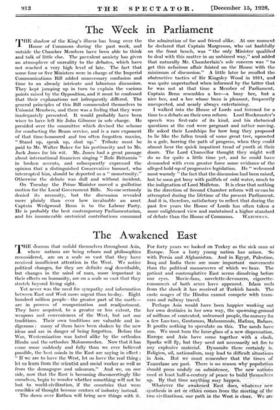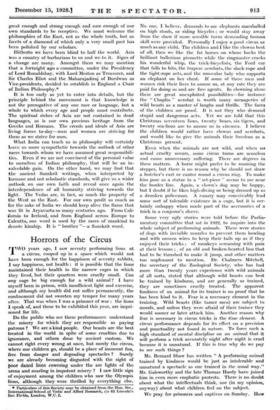The Awakened East
THE dramas that unfold themselves throughout Asia, where nations are being reborn and philosophies reconsidered, are on a scale so vast that they have received insufficient attention in the West. We notice political changes, for they are definite ank). describable, but changes in the mind of man, more important in their effects on humanity, are on a scale so vast that they stretch beyond living sight. Yet never was the need for sympathy and information between East and West more urgent than to-day. Eight himdred million people—the greater .part of the earth— are in process of reorganization and.. readjustment. They have acquired, to a greater or less extent, the :weapons and conveniences of the West, but not our traditions. Their own traditions are valuable and in- . digenous.; many of them have been shaken by the, new ideas and are in danger of being forgotten. Before the War, Westernization was hated alike by the orthodox Hindu and the orthodox Mohammedan. Now. that it has come more suddenly and fully than we ever believed possible, the best minds in the East are saying in effect : " If we are to have the West, let us have the real thing ; let us learn from the scientist and social worker as well as from the demagogue and salesman." And we, on our . side, now that 'the East is hecoming disconcertingly like ourselves, begin to wonder whether something will not be lost to world-civilization, if the countries that were crucibles of thought become -centres- of industry instead.
The dawn over Eothen will bring new • things with it. For forty years we looked on Turkey as the sick man of Europe. . Now a lusty young nation has arisen. ,So with Persia and Afghanistan. And in Egypt, Palestine, Iraq and India there are more important movements than the political manoeuvres of which we hear. The patient and contemplative East seems dissolving before our eyes. Movie-fans, novelette-devourers, cigarette- consumer's of both . sexes have appeared. Islam reels from the shock it . has received at -Turkish hands. The caste usages of the Hindlis cannot compete. with tram- cars and railway. travel.
Perhaps Asia would have been happier working out her own destinies in her own way, the spawning-grOinid of millions of, contented, unlearned people, the nursery for a. few Lao-tses,Gautamas, Mahommeds, Hafizes, Bahars. It profits nothing to speCulate on this The sands have run. We must turn the honi-glasS of a new dispensntion. Europe. and Asia have come together . with a claSh: Sparks will fly, but they need not necessarily set fire to any exploSiCre Material. Dynamite there -certainly is Religion, oil, nationalism, may lead to difficult situations in Asia. But we-. must _reinernber that - the' times of Tamerlane are past. There is no reason why population • . should press unduly on subsis ence, The new nations need at least half-a-centurY of peace to build themscNes up. By that time anything may happen. . . Whatever the awakened East does, whatever- new SYntheSis in art or ethics comes from the meeting the two tivllizations, our path in the West is. clear.: We arc great enough and strong enough and sure enough of our own standards to be receptive. We must welcome the philosophies of the East, not as the whole truth, but as facets of a diamond of which only a very small part has been polished by our scholars.
-Hitherto we have been blind to half the world. Asia was a country_of barbarians to us and we to it. Signs of a change are many. Amongst them we may mention that a fortnight ago a committee, under the Presidency of Lord Ronaldshay, with Lord Meston as Treasurer, and Sir Charles Eliot and the Maharajadiraj of Burdwan as Vice-presidents, decided to establish in England a_Chair of Indian Philosophy.* It is too early as yet to enter into details, but the principle behind the movement is that knowledge is not the prerogative of any one race or language, but a whole to which every age and people must contribute. The spiritual riches of Asia are not contained in dead languages, as is our own precious heritage from the Greeks and Romans. The creeds and ideals of Asia are living forces to-day—men and women are striving for them as we strive for ours.
What India can teach us in philosophy will certainly leave us more sympathetic towards the outlook of other races towards whom we have assumed great responsibili- ties. Even if we are not convinced of the personal value to ourselves of Indian philosophy, that will be an in- calculable gain. On the other hand, we may find that the ancient Sanskrit writings, when interpreted by humane and not scholastic standards, will give us a wider outlook on our own faith and reveal once again the interdependence of all humanity striving towards the light. The Vedas are, in fact, as much the property of the West as the East. For our own profit as much as for the sake of India we should keep alive the flame that was lit in Aryavarta so many centuries ago. From Cali- fornia to Iceland, and from England across Europe to Calcutta, one word is used by the races of mankind to denote kinship. It is " brother "—a Sanskrit word.









































 Previous page
Previous page